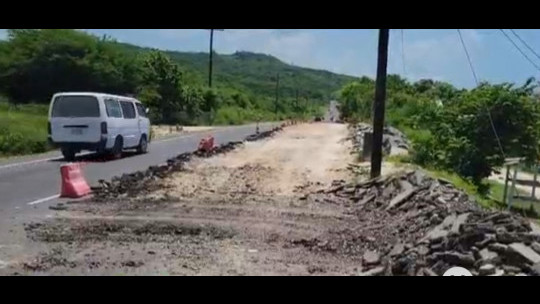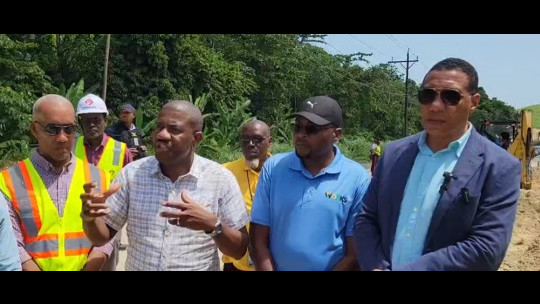.png)
00:00
00:00
00:00
Prime Minister Andrew Holness and Works Minister Robert Morgan
By Nakinskie Robinson/Halshane Burke
Prime Minister Andrew Holness has acknowledged that work on the Southern Coastal Highway Improvement Project in St. Thomas is taking longer to complete than initially expected.
He said the COVID-19 pandemic delayed the supply chain, which affected the delivery of critical pipes needed to complete the project.
Mr. Holness added that other factors have affected the road's completion.
"The original project did not contemplate putting in pipelines, internet and changing of the electricity infrastructure. So with all of those new additions, it has extended the time of the project," he noted.
Importantly, he said, the project is still under construction, so any faults that have occured will be rectified without additional cost to taxpayers, since a defects liability period of two years was built into the road contract with China Harbour Engineering Company.
"I wish and I am hopeful that persons will not seek to make political statements on these issues. These are technical issues and should be addressed as technical issues. And the public has the assurance, if there are weaknesses, if they are failures, we are on top of it and we will correct it at no cost to the public," he reiterated.
Quizzed about the timeline for completion, Minister with responsibility for Works, Robert Morgan, said the project should be finished by March 2025.
"Be aware though that while we are expecting a March completion timeline, the engineers and the NWA (Nnational Works Agency) and the government will be paying very close attention to the road to pick up any defects that may occur," he promised.
Seawall construction
In the meantime, a rubble stone wall is under construction along a section of the Southern Coastal Highway in Rosselle, St. Thomas which was washed out during the passage of Hurricane Beryl.
Prime Minister Andrew Holness pointed out that the damage to the roadway at Rosselle was not caused by defects in the construction of the roadway but by a failure due to a weather event.
He said the government would have to pursue supplementary work to put in a seawall.
"There was an existing wall, so when we were building the road, there was no need to interfere with the existing wall that was in place. But the hurricane damaged the wall. In fact, it totally destroyed the wall and came in onto the road. So this is not a defect of the contractor. This is something now that the government will have to pursue as supplementary work, meaning we will have to have an additional budget, because of the hurricane, to put in a seawall," he explained.
Admitting that the seawall is "not the final or even the most effective defence", the Prime Minister said the government may have to carry out other revetment works that could be "up to two or three times more expensive than the actual roadway itself".











 All feeds
All feeds







